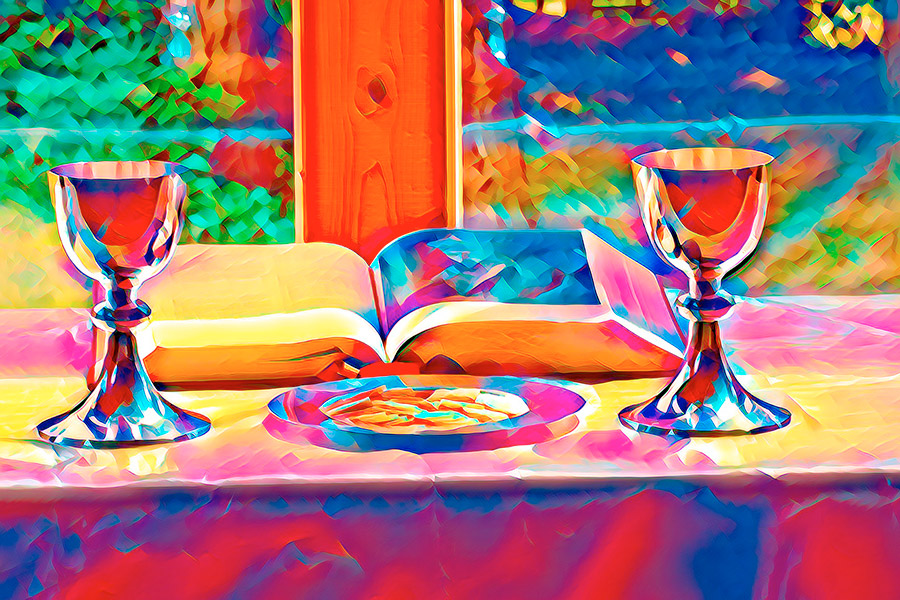Because my wife is a Lutheran pastor, over the last two weeks I have seen many blog posts and Facebook discussions about what to do about communion now that churches can no longer gather physically. Should a pastor maybe say a Eucharistic prayer over the Internet, with all her flock watching from home and commune bread and wine at the appropriate moment? Should lay members be authorized to celebrate the sacrament within their own families, the way some traditions allow for emergency baptism? What do we do now that Jesus no longer comes to us in Word and sacrament?
Especially for those among us for whom the sacrament is a means of grace, this is a real question.
Denominations Weigh in on Online Communion
The denominations with which Pittsburgh Theological Seminary partners are giving different guidelines. The Episcopal bishop of Pittsburgh has come out against virtual communion services, and so have Lutheran bishops. The Stated Clerk of the Presbyterian Church (U.S.A.) advised last week that for pastoral reasons Sessions can authorize online communion, thereby reversing advice from just a few weeks earlier. And it is understandable why churches come down differently, because there are so many difficult theological and liturgical questions that would need to be thought through here.
Rather than trying to answer all those questions, I want to suggest a different approach to the whole issue.
As a society, in the course of a few weeks or maybe even a few days we lost everything we thought that was firm and certain – economically, socially, personally. We suddenly discovered how little grip we have on life. We are trying to survive – in some ways, literally – not knowing what life will look like at the other side of this disaster.
Dealing with the Unknown
As churches, we are sharing in the challenges and anxieties. At the same time, we have a little bit more experience in living while not knowing what the future looks like. What society is experiencing in the course of just a few weeks, we have been living for a number of years. As mainline churches, we have been losing everything that was firm and certain. We have been discovering how little grip we have on things. We have been trying to survive without knowing what new forms life will take on the other side.
When, in the context of all that, we have been think about faithful, missional leadership, we often talk about the need for discernment rather than quick, technical fixes. We have been learning not to try to control things by rearranging the deck chairs and trying to continue with all the things we know and hold dear but rather to live into the place where God is leading us and to ask, “How is Christ present even here? How is Christ at work? And how can we follow him where he goes?”
Right now, Christ is present among us in some ways, but not in others. We know and trust that Christ rules all things, including sickness and death. We know and trust that Christ comes to us as we sing and pray. We know and trust that Christ comes to us when we gather together virtually and hear his word read and proclaimed. But Christ does not come to us through the gifts of bread and wine. And I wonder if, rather than quickly trying to fix that, it wouldn’t be better to embrace it. To engage in a Eucharistic fast.
Eucharist Fasting
Eucharistic fasting is not easy. After all, we are people of flesh and blood, and we do not just want to hear about the goodness of the Lord, but we want to taste and see it. Nonetheless, it is Eucharistic fasting, and not feasting, that Christ seems to give us at this point. And if so, we shouldn’t try to avoid it, but live into it.
Years ago Joseph Ratzinger (the later Pope Benedict XVI) wrote a meditation in which he suggested episodic Eucharistic fasting as living in solidarity with those who, for all kinds if reasons, cannot come with us to the Lord’s Table.[1] And at this moment, there are many of those. The families who cannot not afford computers or Internet connections to check into our virtual services. The elderly who have never mastered these technologies. The sick who are in the isolation of the ICU. The coronavirus patients who are dying without the presence of family, of a pastor, or the consolation of the sacrament.
We are living in Lent. It is the season when we give up on things to prepare ourselves better for the amazing, surprising, transforming presence of the resurrection Lord. Maybe part of this is indeed to give up the Eucharist.
Lent will take longer than normal this year. In many parts of the country and the world it will not be Easter again till June, July, or August. Nonetheless, Easter is coming – when we can physically gather together again, sing together, pray together, wish each other the peace of Christ, and once again receive his bread and wine.
[1] Joseph Ratzinger, Behold the Pierced One: An Approach to Spiritual Christology (Ignatius Press, 1986), 97/8.
The Rev. Dr. Edwin Chr. van Driel occupies the Directors’ Bicentennial Chair in Theology at Pittsburgh Theological Seminary. He teaches mainly in Christology, ecclesiology, and the interaction between Biblical studies and theology. Van Driel is deeply invested in helping the church think about its existence and calling as it moves into an increasingly post-Christian world. Van Driel is the author of Incarnation Anyway: Arguments for Supralapsarian Christology (Oxford University Press, 2008) and is working on “Rethinking Paul: Protestant Theology and Contemporary Exegesis” (forthcoming from Cambridge University Press).


1 thought on “Eucharistic Fasting: The Lord’s Supper in the Time of COVID-19”